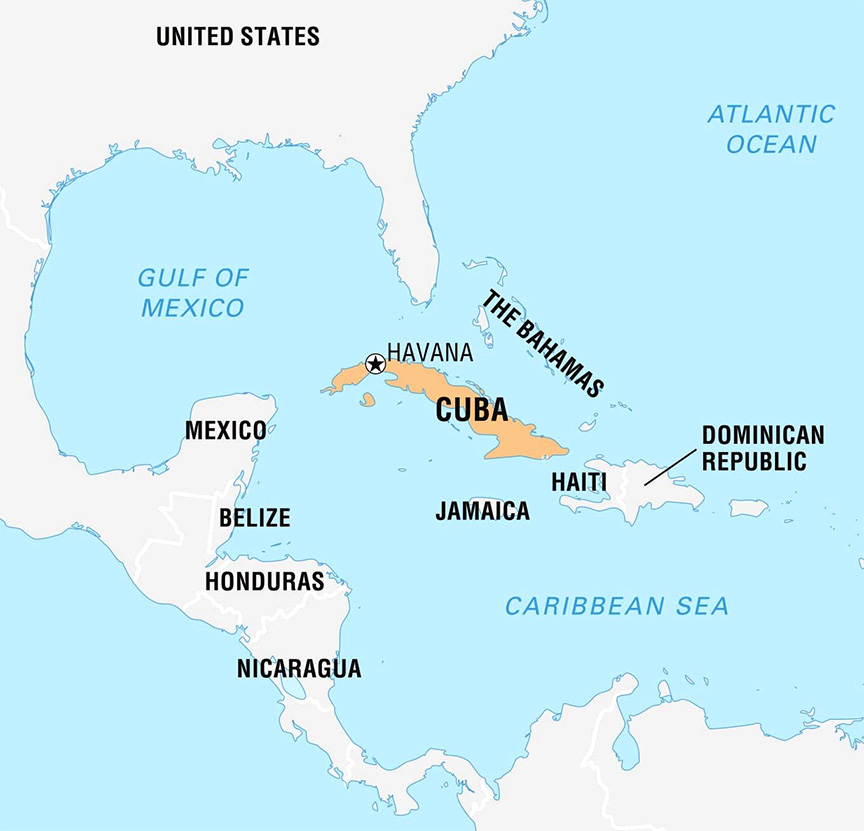Protests in Cuba | 19 Jul 2021
Why in News
Recently, thousands of Cubans took to the streets across the country to protest longstanding restrictions on rights, scarcity of food and medicines, and the government’s poor response to the Covid-19 pandemic.
- These protests are the biggest anti-government demonstrations on the Communist-run island in decades.
Key Points
- Ongoing Protests:
- The anti-government protests erupted amid Cuba's worst economic crisis since the fall of the Soviet Union, its former ally, or end of the cold war (1945-1991).
- Cuba has been an authoritarian communist state for more than six decades.
- Cuba has been hit hard by US sanctions and Covid-19.
- Cubans have been angered by the collapse of the economy, food and medicine shortages, price hikes and the government's handling of the pandemic.
- Protesters shouted "freedom" and demanded for President Miguel Diaz-Canel to step down.
- On the other hand, Cuba's President blamed the US for the turmoil.
- He called tight sanctions imposed by the US on Cuba, has resulted in a policy of economic suffocation and is the prime reason for protests in Cuba.
- Further, the US President said the US stands with the people of Cuba in their call for freedom.
- The anti-government protests erupted amid Cuba's worst economic crisis since the fall of the Soviet Union, its former ally, or end of the cold war (1945-1991).
- History of Cuba:
- From the 15th century, Cuba was a colony of Spain until the Spanish–American War of 1898, when Cuba was occupied by the US.
- However, Cuba gained nominal independence as a de facto United States protectorate in 1902.
- In 1940, Cuba attempted to strengthen its democratic system. But, political radicalization and social strife culminated in a coup and subsequent dictatorship under Fulgencio Batista in 1952.
- Open corruption and oppression under Batista's rule led to his ousting in January 1959 by the 26th of July Movement. This established communist rule under the leadership of Fidel Castro.
- Since 1965, the state has been governed by the Communist Party of Cuba.
- Moreover, the country was a point of contention during the Cold War between the Soviet Union and the United States. A nuclear war nearly broke out during the Cuban Missile Crisis of 1962.
- From the 15th century, Cuba was a colony of Spain until the Spanish–American War of 1898, when Cuba was occupied by the US.
- USA-Cuba Relationship: The United States and Cuba have had a strained relationship for more than sixty years. The tumultuous US-Cuba relationship has its roots in the Cold War. This can be reflected in the following events.
- Cuban Revolution: In 1959, Fidel Castro and a group of revolutionaries seized power in Havana (city capital of Cuba). They overthrew the US-backed government of Fulgencio Batista.
- After the Cuban Revolution, Fidel Castro’s government began nationalizing American-owned properties, imposed economic penalties on trade with the US and increased its trade with the Soviet Union.
- Cuban Missile Crisis: Aftermath of events following Cuban revolution, the United States severed diplomatic ties with Cuba and began pursuing covert operations to overthrow the Fidel Castro regime in 1961.
- This followed an attempt by the US agencies to topple Cuban Government, known as the Bay of Pigs invasion.
- In response, Cuba allowed the Soviet Union to secretly install nuclear missiles on the island. This brought the US and Soviet Union on the brink of Nuclear war.
- In the end, Soviet Union agreed to withdraw the missiles in exchange for a pledge from the US not to invade Cuba and to remove the US nuclear missiles from Turkey.
- US Sanctions: After Cuban Missile Crisis, the US instituted a ban on nearly all its exports to Cuba, which US President John F. Kennedy expanded into a full economic embargo that included stringent travel restrictions.
- These economic sanctions continue till today.
- US President Barack Obama took several steps to normalize bilateral relations, including restoring diplomatic ties and expanding travel and trade.
- However, the Trump administration reversed aspects of the past agreements by reimposing restrictions on tourism and other commerce.
- Cuban Revolution: In 1959, Fidel Castro and a group of revolutionaries seized power in Havana (city capital of Cuba). They overthrew the US-backed government of Fulgencio Batista.
- India's Stand:
- Presently, India is yet to declare its stance on the current ongoing protest, but India in the past has supported lifting the economic blockade of Cuba.
- In the UN General Assembly, India stressed that the continued existence of this siege by the US against Cuba undermines multilateralism and the credibility of the United Nations.
Communist Country
- A Communist country is a nation that is governed by a single party, and the foundation of the ruling leaders' decisions is based on the philosophies of Marx and Lenin.
- Communism is a political, social, philosophical, and economic doctrine aiming to replace private property profit-based economy with common ownership of major means of production.

